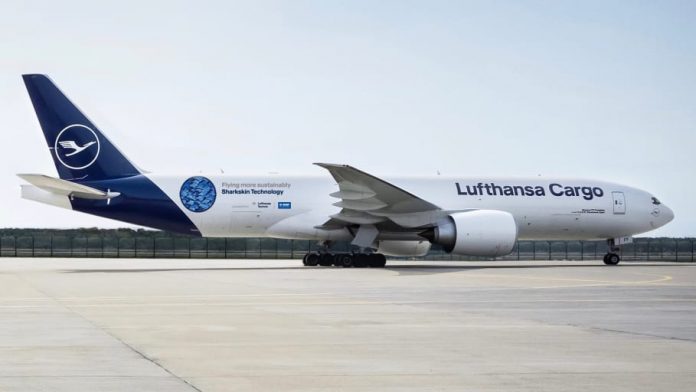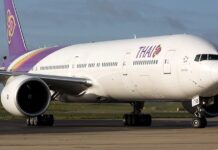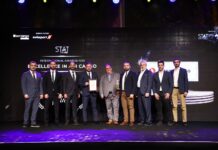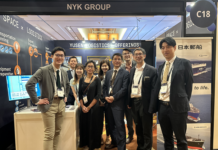
AeroSHARK, a surface film that mimics the fine structure of a shark’s skin, is to be rolled out on Lufthansa Cargo’s entire freighter fleet from the beginning of 2022, making the aircraft more economical and reducing emissions. Lufthansa Technik and BASF have succeeded in making this breakthrough as part of a joint project.
The lower the frictional resistance of an aircraft in the air, the lower the fuel consumption. Using nature as a role model, the aviation industry has been intensively researching ways to reduce aerodynamic drag for many years.
The surface structure consisting of riblets measuring around 50 micrometers imitates the properties of sharkskin and therefore optimizes the aerodynamics on flow-related parts of the aircraft. This means that less fuel is needed overall. For Lufthansa Cargo’s Boeing 777F freighters, Lufthansa Technik estimates a drag reduction of more than one percent. For the entire fleet of ten aircraft, this translates to annual savings of around 3,700 tons of kerosene and just under 11,700 tons of CO2 emissions, which is the equivalent of 48 individual freight flights from Frankfurt to Shanghai.
“Responsibility for the environment and society is a key strategic topic for us,” says Christina Foerster, Member of the Executive Board of Deutsche Lufthansa AG with responsibility for sustainability. “We have always played a leading role in introducing environmentally friendly technologies. The new sharkskin technology for aircraft shows what strong and highly innovative partners can achieve collectively for the environment. This will help us to achieve our goal of climate neutrality by 2050.”
“The aviation industry is facing similar challenges to the chemical industry: ongoing progress must be made with climate protection despite high energy requirements. By collaborating closely and successfully combining our know-how in surface design and aerodynamics, we have now succeeded in taking a major step forward. This is an excellent example of sustainability in practice, achieved through partnership-based collaboration and innovative technologies,” says Dr. Markus Kamieth, Member of the Board of Executive Directors of BASF.
Dorothea von Boxberg, Chief Executive Officer of Lufthansa Cargo AG, said: “We are proud that we will now be able to operate our entire freighter fleet even more efficiently in the future thanks to sharkskin technology and reduce the carbon footprint of our modern fleet further. The investments we have made in rolling out AeroSHARK at Lufthansa Cargo consciously reaffirm our commitment to the United Nation’s sustainable development goal on climate action.”
“We have always used our wealth of expertise as a global market leader in technical aircraft services to also contribute to reducing the ecological footprint of our industry. In doing so, we can leverage significant savings potential from all aircraft generations,” explains Dr. Johannes Bussmann, Chief Executive Officer of Lufthansa Technik AG. “I am therefore very proud that we will soon be able to transfer the positive findings of the validation phase into the series application with Lufthansa Cargo. The extremely constructive collaboration with BASF is also the best example of cross-sector cooperation in the interest of the sustainability of the aviation industry.”
“As an expert in surfaces, we implement bespoke solutions for our customers. The innovative sharkskin technology allows us to support Lufthansa in achieving its sustainability goals and in making the aviation industry a little more environmentally friendly,” says Dirk Bremm, head of BASF’s Coatings division and also responsible for functional films in this role.
อัพเดตข่าวสารและบทความที่น่าสนใจในอุตสาหกรรมโลจิสติกส์ก่อนใคร ผ่าน Line Official Account @Airfreight Logistics เพียงเพิ่มเราเป็นเพื่อน @Airfreight Logistics หรือคลิกที่นี่










